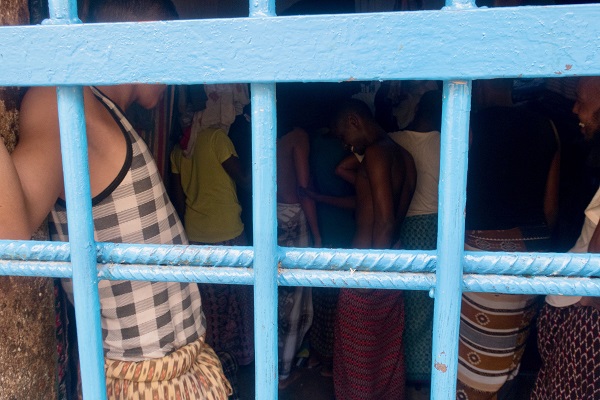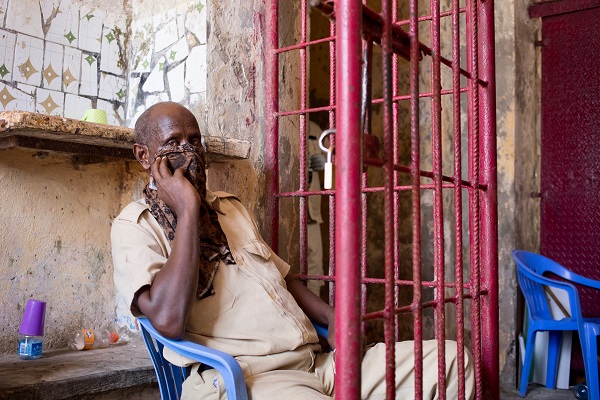
Somalia: Places of detention overlooked during Covid-19 crisis

BAIDOA (HORN OBSERVER) Like most countries around the globe, Somalia finds itself in the throes of the COVID-19 pandemic. The number of known infections has risen dramatically in the last weeks. Sweeping public restrictions have followed suit in a bid to curb the spread of the disease.

Overnight curfews are in effect in densely populated towns while the public is encouraged to observe preventive measures like physical distancing and handwashing. Places of detention, however, may be overlooked during a public health crisis, but are particularly vulnerable, as physical distancing and basic hygiene measures are luxuries many detainees cannot practice.
Overcrowding, shared sanitation facilities, poor hygiene, limited ventilation and access to common areas are examples of structural and organizational factors that can favour the spread of diseases. These factors present perfect conditions for an already highly infectious disease to thrive should one of the detainees or prison staff become infected. The good news is that several handwashing stations are being set up in the detention facilities. Detainees and staff have also been informed on measures they can take to prevent the spread of COVID-19.
"I took part in a talk on hygiene that’s related to the coronavirus outbreak. We have been shown how to wash our hands. Now that water and soap were given to us, inside are my brothers, I’ll show them how to wash our hands when entering the room,” said Ali Ahmed, a detainee in Mogadishu Central Prison.

Hygiene supplies like detergents and soap have been provided at Bosaso Central Prison to improve hygiene in the facilities.
Tight quarters in detention make it nearly impossible to enforce measures like physical distancing measures. While avoiding physical contact like handshakes can be encouraged, prevention guidelines advise to keep one metre from one another since the virus is spread through tiny droplets that travel through the air from someone who has been infected. If a detainee were to get sick, it would be very challenging to practice self-isolation. Additionally, a surge in COVID-19 patients in a place of detention would quickly overwhelm local health care facilities.
The main risk to detainees comes from people coming in and out of places of detention. In most places of detention, new admissions take place regularly. Prison staff and all visitors entering the facility may increase the risk of COVID-19 entering the facility. Some detention facilities in Somalia have already halted family visits to reduce the risk. The ICRC is working with authorities to ensure detainees can stay in touch with their families by phone during the pandemic.
People of all ages can be infected by the new coronavirus. Older people, and people with pre-existing medical conditions appear to be more vulnerable to becoming severely ill with the virus. Detainees are often vulnerable to health issues, older prisoners, those with chronic illnesses, or the chronically malnourished.
Under International Humanitarian Law (IHL) and Human Rights Law (IHRL), detainees’ health and hygiene must be safeguarded, and sick detainees must receive the medical care and attention required by their condition. New arrivals should now be tested for the virus and hygiene measures should be increased.To cover their needs for the next six months, ICRC is distributing COVID-19 prevention information and hygiene items to all detainees and prison staff in 22 places of detention across the country, including the central prisons in Mogadishu, Kismayo, Baidoa and Garowe.
(ICRC/Press Release)
Leave a comment
- Popular
- Rated
- Commented
04/11/2021 - 11:05:02
12/03/2023 - 22:58:08
22/01/2023 - 11:24:06
13/12/2015 - 09:27:08
01/03/2021 - 09:00:37
Opinions
17/04/2024 - 22:46:39
08/03/2024 - 02:04:01
Politics
17/04/2024 - 22:46:39
13/04/2024 - 04:52:30
Terror Watch
09/04/2024 - 12:24:06
25/03/2024 - 02:02:25
Press Releases
18/04/2024 - 21:29:03
13/04/2024 - 10:40:06
 0
0 


































Somalia: Places of detention overlooked during Covid-19 crisis
BAIDOA (HORN OBSERVER) Like most countries around the globe, Somalia finds itself in the throes of the COVID-19 pandemic. The number of known infections has risen dramatically in the last weeks. Sweeping public restrictions have followed suit in a bi